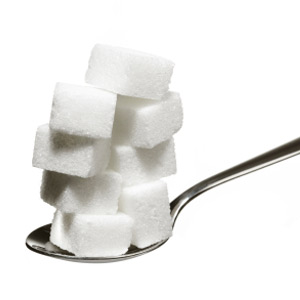Sugar is considered a sweet treat in the U.S. society. An additive to many dishes that will soothe the sweet tooth, flavor up bland food, and satisfy that urge. But in reality sugar is quite the opposite. It is referred to as a poison that can have many harmful effects on your body.
“Pure, White, and Deadly”
 One person who firmly believes the latter is Robert Lustig, professor of paediatric endocrinology at the University of California. Lustig brought an out-of-print book from 1972, “Pure, White and Deadly” by John Yudkin to the forefront, in which he states that sugar does more than just make you gain weight and rots your teeth. Both Yudkin and Lustig believe sugar is the cause of several chronic and common illnesses, among them: heart disease, cancer, Alzheimer’s Disease, and diabetes.
One person who firmly believes the latter is Robert Lustig, professor of paediatric endocrinology at the University of California. Lustig brought an out-of-print book from 1972, “Pure, White and Deadly” by John Yudkin to the forefront, in which he states that sugar does more than just make you gain weight and rots your teeth. Both Yudkin and Lustig believe sugar is the cause of several chronic and common illnesses, among them: heart disease, cancer, Alzheimer’s Disease, and diabetes.
Yudkin was ridiculed for his views and found heavy competition from the food industry. Once Lustig discovered Yudkin’s book, it helped him kick-start the anti-sugar campaign. His lecture “Sugar: the Bitter Truth” calls for sugar to be treated like a toxin, much like tobacco and alcohol. He also believes that sugar-laden foods should be taxed and labeled with health warnings. Not only that, but he believes sugar should be banned for anyone under the age of 18.
Food industry adjusting products
The food industry (specifically the soft drink companies) has backed down from their defensive stance on this research and is making changes to their products. Due to the anti-sugar movement, many in the food industry have started to stand down in their defense against both Yudkin’s and Lustig’s research.
In addition, the World Health Organization is going to recommend a cut to the amount of sugar we consume in in our diets. They want to decrease it from 22 teaspoons per day to half that amount.
15 ways that sugar affects your entire body
1. Sugar reduces the body’s ability to defend against bacterial infection.
2. Sugar reduces high-density lipoproteins (HDL).
3. Sugar can lead to chromium deficiency.
4. Sugar can cause heart disease.
5. Sugar can contribute to osteoporosis.
6. Sugar can lower the amount of Vitamin E in the blood.
7. Sugar can decrease the amount of growth hormones in the body.
8. Sugar increases advanced glycation end products (AGEs), which form when sugar binds non-enzymatically to protein.
9. Sugar can contribute to diabetes.
10. Sugar can impair the structure of DNA.
11. Sugar can promote an elevation of low-density lipoproteins (LDL).
12. Sugar is the number one enemy of the bowel movement.
13. Sugar can cause headaches, including migraines.
14. Sugar can contribute to Alzheimer’s disease.
15. Sugar can be a risk factor for gallbladder cancer.
Safe vs. dangerous forms of sugar
Chances are, you are going to consume sugar in some form at some point in your diet. Knowing which ones are safe and which ones are dangerous is key to healthy consumption.
Dextrose, fructose, and glucose are monosaccharides, also known as simple sugars and should be consumed minimally. The difference in these is how your body metabolizes them. Table sugar is a combination of glucose of fructose. Sugar alcohols, including xylitol, glycerol, sorbitol, maltitol, mannitol, and erythritol aren’t a sugar or an alcohol, but are used as sweeteners. They can cause you health problems like bloating, diarrhea, and flatulence.
Sucralose, also known as Splenda isn’t a sugar, either, but has sugar-like name and taste and marketing slogan. It has detrimental health effects for your body.
Another sugar that is advertised as natural, but is far from natural, is agave syrup. It is highly processed and typically is 80 percent fructose. It isn’t anywhere near the agave plant.
Honey is 53 percent fructose, but it is totally natural when raw and can actually give you health benefits when you use it moderately.
Stevia, a very sweet herb derived from the stevia plant in South America, is completely safe for your consumption when used in its natural form.
How to consume sugar in a healthier way
Truth be told, it’s difficult and unrealistic to eliminate all sugar from your diet. But, if you educate yourself on the healthy ways to consume sugar, you can still enjoy a sweet treat or two.
Say no to soda and sugared drinks. This is one of the easiest things you can do to decrease your fructose intake. Stop drinking these kinds of drinks. Aside from filling your body with fructose, they offer your body nothing else in the way of nutrition. Up your water intake instead. If the thought of drinking plain water bores you to tears, try flavoring it with different combinations of fresh mint, citrus, berries, cucumber, or ginger.
Say goodbye to processed foods with high amounts of sugar. The best option is to cook your own meals from whole, unprocessed foods. While it may not be possible to totally eliminate processed foods from your diet, thoroughly reading labels can help you make more informed decisions in the grocery store. Always check the labels for sugar content. If it lists high fructose corn syrup early in its ingredients, avoid it.
Keep sugar products out of your home. Having cookies, cakes, or candies on hand makes it that much easier to mindlessly overeat sweets. If you really have a hankering that just won’t quit, grab something small or split something with a friend. Fruit and nuts or a square of dark chocolate are often enough to curb sugar cravings.
As you can see, sugar can have quite the negative effect on your body. Awareness of the types and amounts of sugar you consume can help you avoid serious damage. Take measure of what you are putting into your body, get educated on the healthy and unhealthy forms of sugar, and safeguard your body and mind for years to come.


